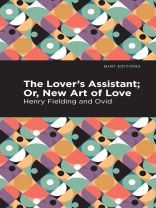“The first taste I had for books came to me from my pleasure in the fables of the Metamorphoses of Ovid. For at about seven or eight years of age I would steal away from any other pleasure to read them, inasmuch as this language was my mother tongue, and it was the easiest book I knew and the best suited by its content to my tender age.” –Michel de Montaigne
The Lover’s Assistant; or, New Art of Love (1760) is an updated translation of Ovid’s Ars Amatoria; or, The Art of Love (2 AD) by English satirist Henry Fielding. Divided into three books, Ars Amatoria; or, The Art of Love was immensely popular—if a little controversial—in its time, and has survived numerous charges of indecency over the centuries. For the modern reader, it should prove a surprisingly relatable work on intimacy from an author of the ancient world. Fielding’s translation, of the first book alone, remains true to Ovid’s Latin while updating its examples and historical context for the contemporary English reader.
At times serious, at others humorous, The Lover’s Assistant; or, New Art of Love uses a mix of down-to-earth examples and relatable references to mythology in order to offer salient advice for the reader longing for love. Maintaining much of Ovid’s content, Fielding replaces the context of the poem—ancient Rome—with that of his contemporary England. Topics include etiquette, remembering birthdays, avoiding unhealthy jealousy, being open to older and younger lovers, and nurturing honesty. With his wry wit and clear-eyed sense of English aristocratic life, Fielding—who is seen as a pioneer of English literature for his work, including the comic novel Tom Jones (1749)—provides a loyal reinterpretation of Ovid’s classic study of romance between men and women. The Lover’s Assistant; or, New Art of Love, although frequently tongue-in-cheek, is an earnest and effective attempt to enlighten and encourage its readers to partake—responsibly—in one of life’s greatest pleasures.
This edition of Ovid’s The Lover’s Assistant; or, New Art of Love is a classic work of Roman literature reimagined for modern readers.
Since our inception in 2020, Mint Editions has kept sustainability and innovation at the forefront of our mission. Each and every Mint Edition title gets a fresh, professionally typeset manuscript and a dazzling new cover, all while maintaining the integrity of the original book.
With thousands of titles in our collection, we aim to spotlight diverse public domain works to help them find modern audiences. Mint Editions celebrates a breadth of literary works, curated from both canonical and overlooked classics from writers around the globe.
About the author
Ovid (43 BC-17/18 AD) was a Roman poet. Born in Sulmo the year after Julius Caesar’s assassination, Ovid would join the ranks of Virgil and Horace to become one of the foremost poets of Augustus’ reign as first Roman emperor. After rejecting a life in law and politics, he embarked on a career as a poet, publishing his first work, the Heroides, in 19 BC. This was quickly followed by his Amores (16 BC), a collection of erotic elegies written to his lover Corinna. By 8 AD, Ovid finished his Metamorphoses, an epic narrative poem tracing the history of Rome and the world from the creation of the cosmos to the death and apotheosis of Julius Caesar. Ambitious and eminently inspired, Metamorphoses remains a timeless work of Roman literature and an essential resource for the study of classical languages and mythology. Exiled that same year by Augustus himself, Ovid spent the rest of his life in Tomis on the Black Sea, where he continued to write poems of loss, repentance and longing.












